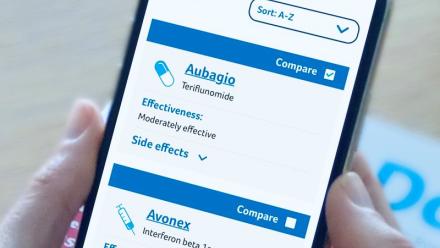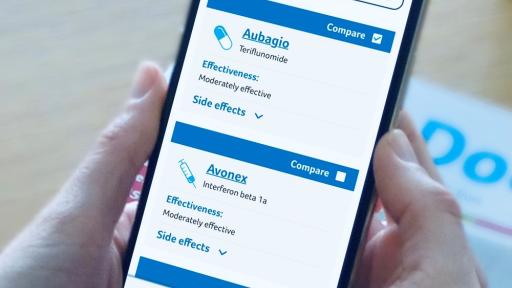Brabio (glatiramer acetate) is a disease modifying drug (DMD) for relapsing remitting MS.
You self-inject Brabio under the skin either daily or three times a week to reduce the number and severity of relapses. It reduces the number of relapses by about one third (30%).
Common side effects include injection site reaction.
What is Brabio used for in MS?
Brabio is a disease modifying drug for relapsing remitting MS. You have fewer relapses than you might have had with no treatment and any relapses you do have should be less severe.
Brabio is a moderately effective (category 1.1) DMD; in clinical trials people taking Brabio had about 30% fewer relapses than people taking placebo. In clinical trials, MRI scans showed people taking Brabio had fewer, smaller or no new areas of active MS (lesions).
Brabio is a biologically similar version of another drug (Copaxone) containing glatiramer acetate.
Brabio can be prescribed for adults with active relapsing remitting MS.
Brabio taken daily has been available for use on the NHS since 2018. It can only be prescribed by a neurologist.
The prescribing advice for Brabio during pregnancy and breastfeeding is appropriately cautious. However, pregnancy registers for Copaxone and clinical experience with Copaxone and Brabio have shown no increased risk to the health of mother or baby.
If you are trying for a family, talk to your MS nurse or neurologist about whether you should continue to take Brabio until you are pregnant.
If you become pregnant while on Brabio, your neurologist or MS nurse may recommend you stop taking it, depending on how active your MS has been and the benefits and risks to you and your baby. Women usually experience fewer relapses during pregnancy, so continuing to take Brabio may not be necessary. However, if Brabio is stopped during pregnancy, it will take several months to reach full effectiveness when restarted and may not reduce relapses during the first few months after childbirth.
Pregnancy guidelines consider that it is safe to take Brabio during breastfeeding if required.
You self-inject Brabio under the skin. Two doses are available: one for daily injections and another for three times a week injections. Brabio is supplied in single-use, pre-filled syringes. An automatic injection device is also available to make injections easier.
Your MS nurse will show you how to do the injections, discuss the practicalities and offer advice or training and ongoing support if you should need it.
What side effects could I get with Brabio?
Common side effects include injection site reactions such as lipoatrophy (leading to permanent indentations in the skin), redness, swelling, itching or some pain at the site.
Occasionally, some people may experience a reaction, known as the immediate post-injection reaction (IPIR), shortly after injection. This may cause flushing, chest tightness, shortness of breath and palpitations. This reaction can last 15-30 minutes, will ease without any treatment and doesn't cause long-term problems. If symptoms last longer than 30 minutes, contact your doctor immediately or go straight to the A&E department of your nearest hospital.
Common side effects (affecting more than 1 person in 100)
- injection site reactions
- lipoatrophy (indentations in the skin)
- headache
- depression, anxiety
- nausea
- feeling weak
- chest pain, pain
- swollen lymph nodes
- gastrointestinal changes
Less common side effects (affecting less than 1 person in 100)
- blood cell changes
- extra heartbeats
- thyroid changes
- dilation of blood vessels
- immediate post-injection reaction (IPIR)
A full list of side effects is included in the manufacturer's Patient Information Leaflet.
Assessment before treatment
Blood tests are not generally required before starting treatment with Brabio.
Assessment during treatment
There is no need for routine blood tests during treatment, but your MS nurse will arrange regular appointments to review how you are coping with Brabio.
Brabio is a synthetic combination of four amino acids, resembling the myelin protein surrounding nerve fibres. It is thought to act as a chemical decoy which diverts an immune attack away from your myelin.
Brabio is very similar to Copaxone; both contain the drug glatiramer acetate. A clinical trial compared the effectiveness of Brabio to Copaxone:
GATE study - 2015 - Brabio compared to Copaxone
In this clinical trial, 794 people with relapsing remitting MS took either Brabio or Copaxone for nine months. The main measures of the study was the number of gadolinium-enhancing lesions, annualised relapse rates and EDSS score, as well as assessing safety and tolerability. As a treatment for relapsing remitting MS compared to Copaxone, Brabio had an equivalent efficacy, safety and tolerability.
-
National Institute for Health and Care Excellence (NICE).
Beta interferons and glatiramer acetate for treating multiple sclerosis
NICE technology appraisal guidance TA527
Full guideline (link is external)
Cohen J, et al.
Equivalence of Generic Glatiramer Acetate in Multiple Sclerosis: A Randomized Clinical Trial.
JAMA Neurology 2015;72(12):1433-41
Summary (link is external)


